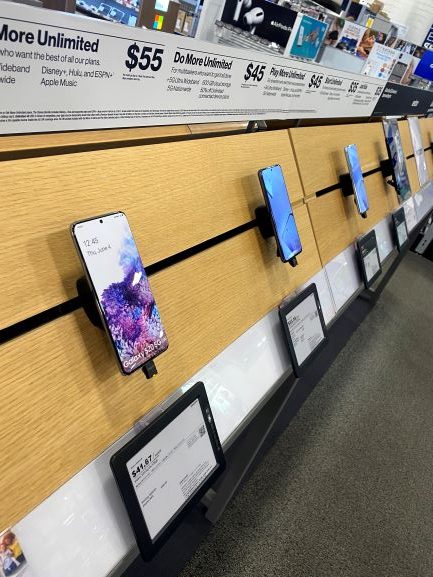Requiem for a Laptop
The Best of Times Gone Blue

An attempt to salvage a dear computer fell solidly flat.
March 19, 2021
From the dreary, wet concrete outside the Best Buy electronics store on Shelbyville Road, I could feel my face slowly lit by neon. Inside, a haven from the rainy darkness awaited.
The doors opened at the touch of my footstep, and the pitter-patter of nature receded, ricocheting off the building’s exterior and into obscurity. It might as well have been another planet.
Around me lay thousands of glossy products organized by their purpose, function, and cost. They were colorful, declaring their names to me in that almost identical sans-serif font which Silicon Valley seems to adore.
Their constituent parts no longer mattered: plastic from the oil of Arabia, batteries from the cobalt of the Congo, software scrupulously designed by engineers in California. They had prostrated themselves on the shelves for the holy purchase. They would be picked, jubilant, from the shelf by dirty and scarred human hands.

I made my way to the “Geek Squad” service counter, with my destroyed computer in hand. Waiting in line, sufficiently distanced, I watched the customer in front of me sort out an issue with the employee. After the exchange of a few words, the customer left the counter and walked out of my sight. I filled the vacancy. Setting my computer down on the counter, I explained my issue.
“Um, I don’t have an appointment or anything. This laptop is just, it’s been blue screening, like, constantly, whenever I do anything like video calling or anything. I wiped the hard drive a few weeks ago, and it’s still just, like stuttering, a lot.”
The computer had been my companion throughout high school. I wrote papers, designed PowerPoints, and edited videos on this laptop for four years. It had accompanied me through the autumns and winters, helping me translate my mind into tangible product. It had seen my life play out, and watched me, from its tiny, beady-eyed camera, grow and learn.
It had seen stress and joy and disappointment. I had dropped it, quite a lot, and it had found company in a cycling flurry of books and papers that occupied my backpack, the only truly permanent resident of that space. I imagine it was sad to see my freshman biology book leave, and joyful when it discovered that I would reuse my calculus book for senior year.
It was difficult to discern the face of the employee, with that mask covering. The store was closing in roughly 20 minutes, but you could not tell. Employees buzzed around the store, helping customers. The static of industry and electronics filtered and diffused in every aisle.
The LED screens and bright colors blared throughout the warehouse, conquering fatigue. Middle-aged couples, likely unaware that many of the products were being sold at a lower price online, listened to the technical advice of younger, blue-suited, workers. There was no sign of closing.
After a few minutes, my conversation with the employee began to turn circular. I was probably never going to boot up my laptop again. It was dead. I had no recourse. All those memories, stored and circulating in billions of bits, would now be unobtainable. This was a piece of scrap metal. I thanked the employee and went on my way.
I spent the store’s last 15 minutes browsing the aisles, watching customers and reading the names of the products caught in this eternal march. Their names were almost useless, soon to be replaced by one with a higher number or lost in a sea of other, almost identical, products.
I reflected on the strange, self-destructive nature of the store itself, a brick-and-mortar testament to a bygone era, selling the marked-up cutting edge that would inevitably be replaced.
The mostly young employees knew this world inside and out, and when I asked them questions or for advice, their knowledge came pouring out in recommendations, spec lists, and jargon I barely had a handle on.
Rapidly approaching closing time had no effect on them. They continued to list for me what would be best for a new computer, factoring in the requirements for college engineering or anything else I would need. I would find out a few days later that what I needed was much less than what they told me.
I will finish high school with a clunky laptop my father lent me from work. It has just enough power to complete the tasks I need for my classes, and I will worry about the rest later.
When I left the store, stepping back into the greyish, wet twilight, I found myself a bit relieved. All that was left was the light from that giant yellow sign behind me, the soft, spritzing patter of cold, mid-winter rain, and the droning sound of speeding cars coming off the highway.


Scott Holzknecht • Apr 29, 2021 at 11:20 am
RIP Old Laptop. Ya done good ole boy. Ya done good.
Shayne Hull • Mar 23, 2021 at 11:08 am
A very well-written piece, John. Enjoyed your first-person, low-key, observational humor.
Rachel Hall • Mar 22, 2021 at 8:45 am
Great piece, John! Stay with writing. You have a gift for it; and I bet you’ll find it quite therapeutic. Nice work!
Sue Schaefer • Mar 20, 2021 at 9:14 am
I completely enjoy your style of writing! Sorry about the loss of your laptop. They don’t live forever. BTW, I’m one of those upper-“middle-aged” people, but would never buy from big box stores. A once-high-end device that has been refurbished is the way to go. Keep writing!!